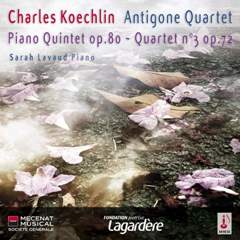Charles Koechlin - Piano Quintet - Quartet No.3 (2009)
Charles Koechlin - Piano Quintet - Quartet No.3 (2009)

Quintet for Strings and Piano, Op. 80 1 The Obscure Wait of What shall be… 2 The Enemy Attack - The Wound 12:12 3 Consoling Nature 10:17 4 Finale - The Joy 9:54 String Quartet No. 3, Op. 72 5 Very calm 3:39 6 Scherzo 4:12 7 Adagio 3:27 8 Final 2:36 Antigone Quartet: Floriane Bonanni - violin Saori Furukawa - violin Aurelia Souvignet-Kowalski - viola Pauline Bartissol - cello Sarah Lavaud - piano
Charles Koechlin was known as a charming and highly honest man and the works on this CD confirm that it is beyond doubt that he suffered a great sense of shock as the First World War unraveled.
Although there is no suggestion that it was a conscious decision, in the works presented on this CD, one can hear the sense of anger Koechlin suffered, especially in the Scherzo of the third quartet, the horror he felt at the slaughter led to the birth of the Piano Quintet.
Performed by the Antigone Quartet and accompanied by pianist Sarah Lavaud, this disc is a wonderful representation of the French music scene at the time of World War 1. ---prestoclassical.co.uk
This disc is a perfect demonstration of what treasures might be waiting to be rediscovered among Charles Koechlin's huge and still drastically undervalued output. Both the Piano Quintet and the Third String Quartet were begun during the first world war, and the bulk of work on them was completed soon after hostilities ended; the Quartet was first performed in 1924, but Koechlin continued to revise the Quintet for another 10 years before it received its premiere.
Both works are reactions to the horrors and the carnage of the war, but stylistically they are very different. Most of the Quartet is identifiably and in some ways unremarkably French, with echoes of early Debussy and Fauré especially in the conversational exchanges of the opening movement, a diatonic slow movement and a folksy, uncomplicated finale. But the Scherzo, which is second in the sequence, is something else altogether. With its martial, trumpet-like flourishes and drumrolls, it evokes the same world as the central movement of Debussy's two-piano En Blanc et Noir, composed around the same time, but there's an extra edge of brittle sarcasm to the music that seems to prefigure early Prokofiev and Shostakovich, as well as the French composers of Les Six, several of whom were taught by Koechlin. Sign up for the Sleeve Notes email: music news, bold reviews and unexpected extras.
The 40-minute Piano Quintet is even more remarkable: it's an attempt to translate the experience of war into abstract instrumental music. The four movements all have descriptive titles – The Obscure Wait of What Shall Be; The Enemy Attack – The Wound; Consoling Nature; Finale – The Joy, and the first two contain some of the most extraordinary music Koechlin ever wrote. The first movement, spectral and glacially slow, verges on atonality at times; the second, a scherzo, brings two very different musical ideas into violent confrontation; there's then a radiant, consoling slow movement and an unbuttoned, celebratory finale, but it's the memory of the first two movements that lingers. Both works are superbly played by the young Antigone Quartet, with Sarah Lavaud joining them for the Piano Quintet. The whole disc is a revelation. ---Andrew Clements, heguardian.com
download (mp3 @320 kbs):








